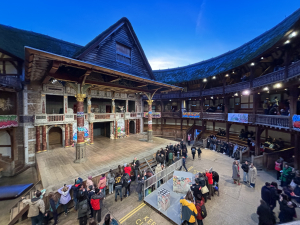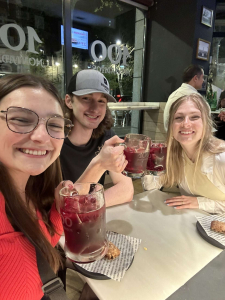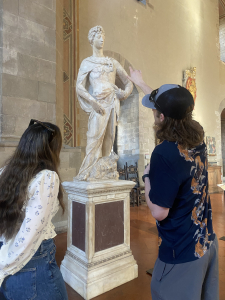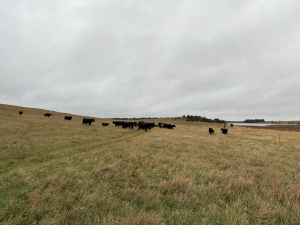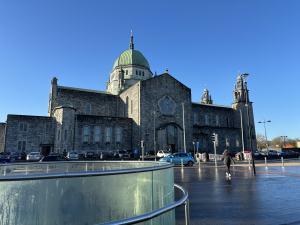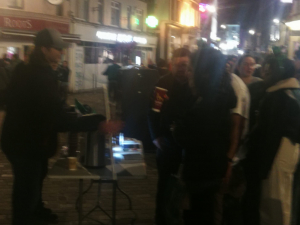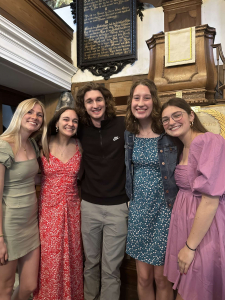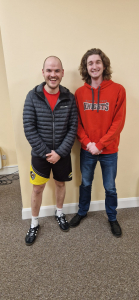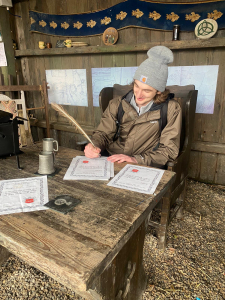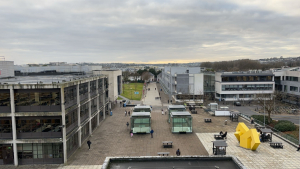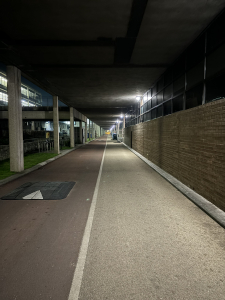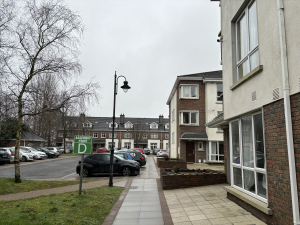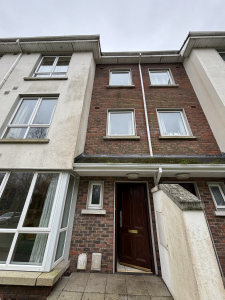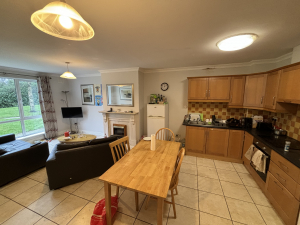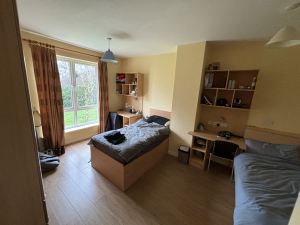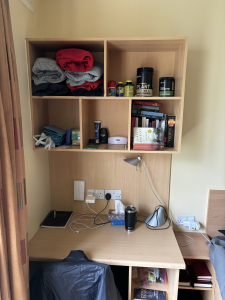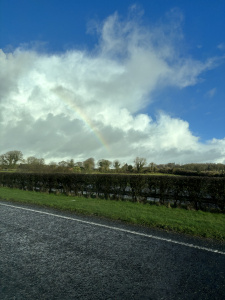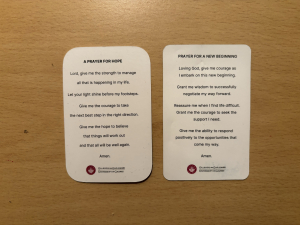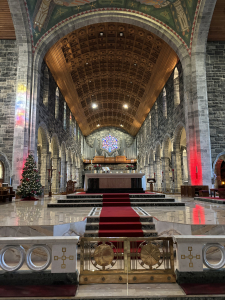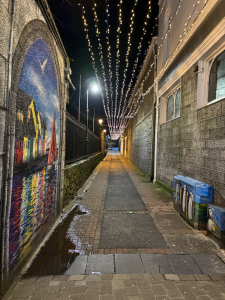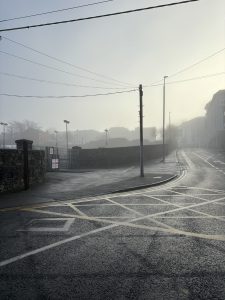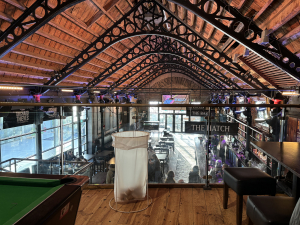The End…?
Wow. It feels like I was sitting in my bed at home typing my pre-departure blog just yesterday. But here I am, four months later, sitting in the same position, writing my final blog. My experience studying abroad in Ireland was fantastic! I can genuinely say that I loved everything about it (both the good and the bad). However, I am so glad to be home. Before I begin reflecting on my experience, I want to tell you a story. In my Medieval Literature class, we read an Arthurian legend called Sir Gawain and the Green Knight. Here’s a very simplified version of the story:
Our story begins with King Arthur in his court celebrating a Christmas feast. The feast is interrupted by a mysterious Green Knight who offers Arthur a unique proposition. The Green Knight’s proposal is simple: Arthur can strike the Green Knight’s neck (unchallenged)– if the Green Knight dies, Arthur wins the axe, but if the Green Knight survives, Arthur will have to face a return blow in precisely one year. Arthur wants to accept the challenge, but after some deliberation, Gawain decides to take Arthur’s place. Gawain takes the axe, holds it high overhead, and THUNK! The axe passes cleanly through the Green Knight’s neck, and his head is chopped off. Blood spurts everywhere, and as you can probably imagine, it’s a very gory scene. But here’s the thing– the Green Knight stands up, picks up his head, and says to Gawain, “See ya in a year!” and rides away on his horse. As you can imagine, Gawain is terrified. About nine months pass, and then Gawain sets off to find the Green Knight’s castle to receive his return blow. On his journey to the Green Knight’s castle, he faces several trials and tribulations (I won’t spoil them for you), and he eventually meets the Green Knight to receive his return blow. Spoiler alert: Gawain survives. Gawain returns home from his quest triumphant, but when he arrives back at Arthur’s kingdom, he feels like something is off. He’s gone on this great adventure, learned much about himself, survived, and even though he’s looked forward to returning home, his home feels uncanny. He feels out of place among his friends and family. And that’s how the story ends.
The reason I retold that entire story is because I feel like Gawain. Everything has been surreal and uncanny since returning home about two weeks ago. Sometimes, it hasn’t felt like I’m even at home. Other times, I’ve felt like a stranger in my homeland. To apply a modern term, what I and Gawain have experienced is called “reverse culture shock.”
Supposedly, it can be worse than standard culture shock, but I have yet to experience anything worse than the culture shock I dealt with in my first two weeks in Ireland. Most of the reverse culture shock I’ve experienced involves little things here and there. Here are a few examples:
- Paper towels. Paper towels are in public restrooms here! The bathrooms in Ireland only had air dryers, which I dislike. Yes, I understand it’s better for the environment, but my hands don’t get dried unless I stand there forever. God bless America and her paper towels!
- Single-use plastics. There were some single-use plastics in Ireland, but not nearly as many as in the United States. I would encourage you to count how much plastic you use daily. You’ll probably be shocked. I’ve noticed that I use more plastic in the US, mainly because I’ve been drinking coffee after coffee from my Keurig.
- Water in the toilet bowl. The toilets in the US have SO MUCH water in them that’s unnecessary. Toilets in the US have probably five times the amount of water as toilets in Ireland. I don’t understand why there’s so much. It’s wasteful, and quite frankly, it splashes.
- Traffic. Galway has the worst traffic in Ireland. Ireland has some of the worst traffic in Europe. Although I never drove in Ireland and rarely rode in cars, I was constantly surrounded by traffic. Driving in South Dakota/Minnesota has been weird. I drove 14 miles on Highway 14 at around 10 am on a Friday without seeing a car. I’m genuinely from the middle of nowhere– and I’m okay with that! On a side note, I’m enjoying the silence of being at home. Instead of waking up to the sound of traffic in the morning, I wake up to birds chirping.
Shifting gears, I’d like to reflect a bit on my experience by answering some questions that I’ve been asked to answer:
- What are you most proud of?
- I met an American girl in my study abroad group. I could not stand her from the moment I met her. She drove me up a wall and pushed my buttons. We had very differing views on several things. I wanted to avoid her, but instead, I forced myself to try to get to know her and enjoy her presence. Guess what? I ended up getting along with her and now consider her a friend. I’m very proud that I didn’t take the easy way out by avoiding her. Instead, I tried my hardest to show her Christian love and was rewarded with a new friend.
- What would you do differently if you could?
- I mentioned earlier that I loved everything, both the good and the bad. While that is the truth (because I don’t believe in wasting time on “what ifs”), if I had to change one thing, I probably would’ve picked a bigger city to live in. By the second weekend I was in Galway, I had seen everything there is to see in Galway. If I had gone to a bigger city, there would’ve been more great things to explore and see.
- What will you incorporate into your life back home?
- I kept a daily journal in Ireland and plan to continue to journal daily. I did a poor job when I first arrived home, but I’ve been getting back into the habit in the past few days. In my daily journal, I wrote a prayer each day, and the most sensational experience I’ve had is reading old prayers and seeing how God has answered them.
- What are you most grateful for?
- I am most grateful for the opportunities I had to travel at the end of my semester. I visited London, Madrid, Rome, and Florence in two weeks. I loved London– there were so many cool things to see– and my favorite was seeing a modern adaptation of Romeo and Juliet in the Globe Theater. 100% worth it. Madrid was charming, and I loved my time with the best tour guides I could ask for, Sarah and Alaina! I did not care so much for Italy. While I loved the history, ancient landmarks, and artworks, I despised the infrastructure and the tourists. Yes, I know I was a tourist, but there were simply too many people. I also found the cities to be dirty and the air quality terrible. Nevertheless, I enjoyed all of my experiences traveling.
- How have you seen God’s hand in your experience abroad? What unexpected blessings or provision have you seen?
- I saw God’s hand everywhere, especially in answered and unanswered prayers. It surprised me, but when I think of the times that God felt the furthest away from me, he tended to be closer than ever.
- Some unexpected blessings were the opportunities to make good Christian friends and learn about other Christian beliefs. After interacting with Christians of various denominations, I became more convicted of my personal beliefs. Also, changing my major to the pastor track was entirely unexpected!
- What advice would you give future semester-abroad students?
- Do your research. I went into my experience without knowing much about where I was going. I also didn’t know much about the university I would attend. I would’ve benefited from more time exploring the internet and learning about where I would live for 3.5 months.
- Know yourself. I think one of the keys to the success of my study abroad experience was making sure that I prioritized what I needed to do to take care of myself. For example, I always made sure that I had plenty to eat. I made sure I slept enough. I made sure I set aside time for reading and writing each day. I went to the gym multiple times per week. In other words, I developed a routine and stuck to it. By having control over my daily routine, I could deal with many of the uncontrollable aspects of studying abroad with grace and a clear mind.
Now that I’ve returned from Ireland, what’s next for me? Well, I’m headed to work. I’ve started working in the warehouse at Millborn Seeds (my family’s business), bagging seed mixes and preparing shipments. I worked there in high school all the time, and (surprisingly) I’m having fun “reliving my glory days.” Not only am I working in the warehouse, but I’m also helping my Dad with some cowboy work. I’ve tagged along several days to help check cattle and help with anything my Dad might need. Sometimes, it’s as simple as opening a gate; other times, it’s holding a ferocious calf in a chute to prevent it from kicking me. I love it all. It is gratifying to do honest work with my hands.
I’ll continue to work for about a month until I leave for Buenos Aires, Argentina, for my second Spanish immersion trip. I’ll be spending five weeks studying Spanish literature this year, and I’m incredibly excited. Once I return from that trip at the end of June, I’ll move back to New Ulm, where I’ll be house-sitting for Professor Degner and bartending at the New Ulm Country Club. Once August hits, I’ll return to school, beginning my studies in Greek, Hebrew, and Theology. I’m thrilled for the future.
Finally, I’d like to end with a special treat:
“David, you’ve read all those books (33.5 in total). Which ones would you recommend?”
- Sir Gawain and the Green Knight by Anonymous
- On Writing: A Memoir of the Craft by Stephen King
- For Whom the Bell Tolls by Ernest Hemingway
- Brave New World by Aldous Huxley
- Lonesome Dove by Larry McMurtry
- Stoner by John Williams
- Summertime by J.M. Coetzee
Thank you for reading my blog(s). I enjoyed writing them as much as I enjoyed studying abroad. I found all of the writing and reflection that I did valuable for my experience.
Photos explained:
- My view in the Globe Theater
- Passing time with my lovely tour guides in Madrid
- Teaching my friends about Donatello’s Marble David in Florence
- A photo from checking cattle
